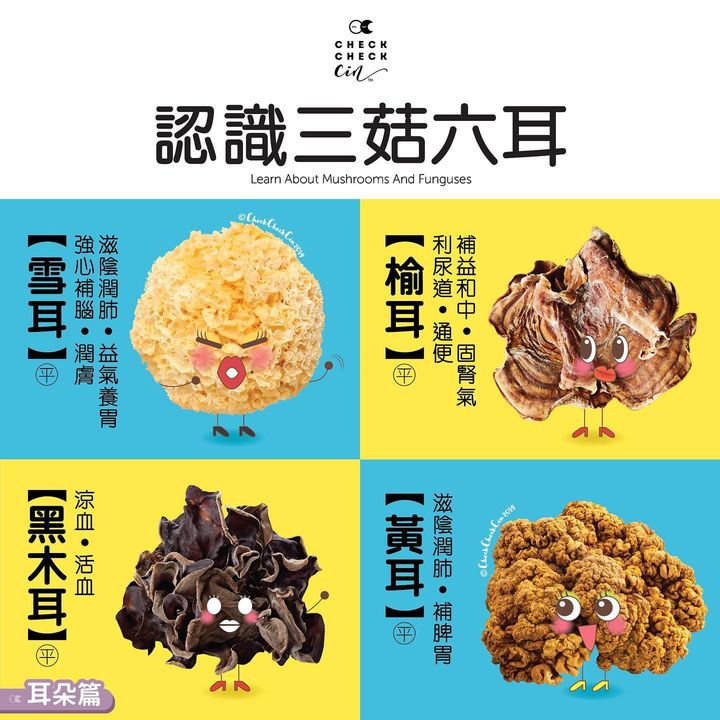November 28, 2019
【食材百科】木頭上長出來的耳仔
認識三菇六耳
你或許認識不少三姑六婆*,但「三菇六耳」又可有聽過?「三菇六耳」是中式齋菜鼎湖上素及羅漢齋的傳統食材,三菇是指冬菇、草菇、蘑菇,而六耳是木耳、雪耳、黃耳、榆耳、桂花耳及石耳,當中的桂花耳和石耳已經找不到,這些長在木頭上的菇菌類植物形同人耳,從中醫角度來各有不同養生功效,但要注意這些耳類都是生長在潮濕環境的木頭上,所以痰濕和濕熱體質人士不宜多吃,以免「濕上加濕」。
耳類一般曬成乾貨出售,烹調前要花時間浸發,但要注意浸發時間不宜過久,否則容易滋生細菌引致食物中毒,宜按耳類厚薄大小調整浸發時間約一至三小時不等,浸至軟身即可烹調。
木耳 — 又名黑木耳、雲耳,性平,具涼血、活血功效。氣虛、血虛、陽虛、脾胃虛弱、容易腹瀉人士、婦女行經期間及孕婦不宜服用,痰濕及濕熱體質人士不宜多吃。
雪耳 — 又名銀耳、白木耳,性平,能滋陰潤肺、益氣養胃、強心補腦,因為有植物膠質所以具潤膚功效,所以有「平民燕窩」的別稱。惟寒咳、痰濕及濕熱體質人士不宜多吃。
黃耳 — 性平,滋陰潤肺,補脾胃功效更勝雪耳。寒咳、痰濕及濕熱體質人士不宜多吃。
榆耳 — 又名雞冠耳,性平,具補益和中、固腎氣、利尿道作用,有通便、調節腸胃的功效,痰濕及濕熱體質人士不宜多吃。
*「三姑六婆」原指不同職業的婦女,包括尼姑、道姑、媒婆、穩婆等,現在泛指愛講八卦是非的人。
Learn about mushrooms and funguses
You may have heard the Chinese phrase “three aunts and six old ladies”*, but have you heard of “three mushrooms and six funguses”? “Three mushrooms and six funguses” is the traditional ingredients of Chinese-style vegetarian dish Dinghu vegetarian dish and Buddha’s delight. Three mushrooms refer to Shitake mushroom, straw mushroom, button mushroom. Six funguses refer to black fungus, snow fungus, yellow fungus, elm fungus, osmanthus fungus and stone fungus. Osmanthus fungus and stone fungus can no longer be found. These mushrooms and funguses grow on wood and are shaped similar to human ears. From Chinese medicine perspective, they have different health effects, but it should be noted that these funguses are grown on humid wood, people with phlegm and dampness and damp-heat body condition should not eat too much.
Funguses are generally sold in sun-dried form. They require soaking before cooking, but not for too long as that can breed bacteria and cause food poisoning. The soaking time should be from one to three hours according to the size of the funguses. Soak until soft to cook.
Black fungus- mild in nature, can cool blood and improve circulation. Those with qi deficiency, blood deficiency, yang deficiency, asthenic weak spleen and stomach, prone to diarrhea, women during menstruation and pregnant women should not consume. Those with phlegm and dampness and damp-heat body condition should eat less.
Snow fungus- also known as silver or white fungus, mild in nature, can nourish yin and moisten lungs, replenish qi and strengthen spleen and stomach, strengthen heart and nourish the brain. It contains plant colloid which is great for moisturising skin so it is also known as “cheap bird’s nest”. Those with cold cough, or those with phlegm and dampness or damp-heat body conditions should eat less.
Yellow fungus- mild in nature, nourishes yin and lungs. Its healing effects to strengthen spleen and stomach are stronger than those of snow fungus. Those with cold cough, or those with phlegm and dampness or damp-heat body conditions should eat less.
Elm fungus- also known as chicken crown fungus, mild in nature, can nourish the body, strengthen kidney qi, promote diuresis, relieve constipation and regulate digestive system. Those with phlegm and dampness or damp-heat body conditions should eat less.
* “Three aunts and six old ladies” originally mean women of different occupations, including nuns, Taos, matchmakers, and midwives. Now they generally refer to people who love to gossip.



